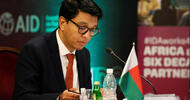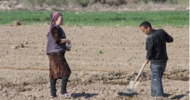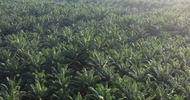29 March is Day of the Landless, it marks the founding anniversary of Asian Peasant Coalition and the launching of No Land, No Life! campaign. 126 organizations from 24 countries are issuing the following statement to commemorate the struggle of rural communities around the world for land and resources.
In a strong show of support to rural communities asserting their right to land, 139 organizations from 26 countries across Asia Pacific, Africa, Latin America, North America and Europe issued a joint statement to mark the Day of the Landless last 29 March with several solidarity actions were also held on the same day.
The PAN Asia Pacific (PANAP) together with farmers, farmworkers, fisherfolk, indigenous peoples, rural women and youth across Asia Pacific declare 29 March as the “Day of the Landless” aims to highlight land and resource grabbing as human rights issue.
The focus of this year's World Water Day is on water and food security, and the Interfaith Center on Corporate Responsibility launches a campaign to educate institutional investors on the impacts of large acquisitions of farmland in the global South.
- Sustainability Investment News
-
22 Mar 2012
As various peasant and indigenous people’s groups gear up for the “Day of the Landless” on 29 March, regional advocacy group PAN Asia Pacific (PANAP) today joins the global outcry for justice for slain land activists and indigenous people’s leaders in Honduras and Colombia whose deaths are apparently linked to their strong opposition to large-scale corporate mining and logging.
Partner organizations of Pesticide Action Network - Asia and the Pacific launch a book compiling seven case studies on land grabbing in the region as part of its activities to mark "World Foodless Day"
Marks the World Food Day, Asian Peasant Coalition (APC) exposing real situation facing farmers and other small food producers that resist against land and resource grabbing and struggle for genuine agrarian reform as the only way out of chronic poverty and hunger.
Groups from Asia and Africa issue statement to mark International Human Rights Day.
Development funds from European governments helped to rescue a Canadian company that pays workers as little as $1/day to toil on some of Africa's largest palm oil plantations in the Democratic Republic of Congo.
Pesticide Action Network Asia and the Pacific and its partner communities will commemorate this year’s ‘World Foodless Day’ on October 16 through a coordinated campaign against landgrabbing
The 19th century had the Great Scramble for Africa, when developed nations raced for several decades to lay claim to new territories and their riches. This century may yet be known as the Great Selloff of Africa.
- Toronto Star
-
03 December 2011
The most unbelievably naïve reaction to the news that a mysterious Chinese company is hoping to buy up to $1.5 billion worth of dairy farms came from Federated Farmers, which said that this is an “unintended consequence” of the NZ/China Free Trade Agreemen
As the land and resource grabbers remain determined to take away what rightfully belongs to the people, we must be more resolute than ever in our struggle to defend land, resources and human rights. A join statement by landless peasant, farm workers, indigenous community and civil society organisation.
Businesses and wealthy oligarchs have taken ownership over huge tracts of agricultural land, and pushed into poverty a large number of smallholders.
Three years later after going into receivership, hopes of revival are a withering prospect and hundreds of families that once formed a thriving community revolving around the Naivasha-based company are living in squalor.
- The Nation
-
14 February 2017
Pakistan has announced an investment policy which is encouraging the corporate sector to engage vast lands in all four provinces of Pakistan on very easy terms.
- Pakistan Today
-
18 April 2012
Majority of workers have stopped working on the oil palm plantation until the SOCFIN General Manager addresses concerns raised in the Malen Youth Development Union’s letter dated 20 May 2017.
- Concord Times
-
19 June 2017
Two global movements supporting Indigenous Kuoy communities in Cambodia submit a petition to embassies of China and Cambodia calling for the pullout and accountability of Chinese state-owned enterprise Guangdong Hengfu Group Sugar Industry Co., Ltd.
Still the most effective way to counter the land grabbers is the collective action of rural communities to resist and to assert the people’s rights to their own land and resources.
Rights groups say the government has failed to give compensation and prevent the victims of forced evictions from being dragged into poverty
La Via Campesina is mobilising on April 17 to oppose the current offensive by some states and large corporations to grab land from the farmers, women and men, who have been cultivating it for centuries.
- Via Campesina
-
16 April 2012
Some say the agribusiness Gadco's presence in eastern Ghana is the best thing that's ever happened in the region. Others fear that there are accidents waiting to happen.
- Think Africa Press
-
15 January 2014
The Philippines, Brazil and Colombia ranked as the deadliest countries for farmers, farm workers, indigenous people and land rights activists.
Mr John Peter Amewu, Minister of Lands and Natural Resources, has lamented over the plight of peasant farmers who have lost their lands and thrown into abject poverty as a result of land grabbing.
- OpEd News
-
12 October 2010
In Uganda, land grabbed by local land brokers are immediately handed over to foreign companies, which then often grow the same crops as the villagers were growing before they were evicted.
- Ugandan land defenders
-
20 September 2021
Large land concessions are detrimental to the livelihoods of rural communities, who have drawn little benefit from these concessions and have had no effective remedy or recourse when their rights are infringed or violated.
Ukraine's newly appoined Minister of the Economy has managed money-losing funds for years as partner of agribusiness investor East Capital, but he never presided over anything as hopeless as the Ukrainian economy.
- Bloomberg
-
06 January 2015
The global land grab is not the consequence of ad hoc crises; it is the logical outcome from the policies and political environment laid down before it.
The problem is often not so much regulations as the failure to implement them or a lack of practical control, write Annelies Zoomers and Mayke Kaag.
- The Conversation
-
25 April 2014















